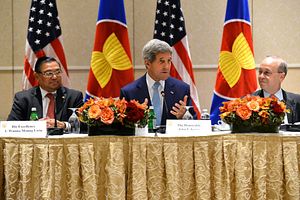U.S. Secretary of State John Kerry will visit the Philippines next week, making him the first administration official to meet new Philippine President Rodrigo Duterte, the State Department confirmed Tuesday.
Kerry was already set to travel to Laos July 25-26 for a series of regular regional meetings including the ASEAN Regional Forum, the East Asia Summit Foreign Ministers Meeting, the ASEAN-U.S. Ministerial Meeting, and the Lower Mekong Initiative Ministerial Meeting. Those meetings are expected to feature a range of topics, including the regional security architecture, transnational challenges such as maritime security, illegal, unregulated and unreported fishing, and the South China Sea. The meetings will be held in Vientiane as Laos is this year’s ASEAN chair.
But on Tuesday, State Department spokesman Mark Toner announced that Kerry would also be adding a stop in the Philippines, a U.S. treaty ally, on his Asia travel from July 26-27. During his time in Manila, Toner said, Kerry would meet with Duterte as well as Philippine Foreign Secretary Perfecto Yasay. During these interactions, he said, Kerry would “discuss the full range of our cooperation with the new Filipino administration.”
Kerry’s visit to the Philippines would make him the first administration official to meet with Duterte since he was officially sworn in on July 1. U.S.-Philippine interactions under Duterte have thus far been limited to a series of phone calls, including one between Obama and Duterte following his reelection, a meeting between Ambassador Philip Goldberg and Duterte on June 13, and a few recent trips by Counselor Kristie Kenney July 9-12 as well as a congressional delegation. As I have written previously, Duterte has been publicly voicing his long-held suspicion of the United States, even though his advisers and some U.S. officials emphasize that he is more pragmatic in private (See: “The Philippines Under Duterte: Reassurance Needed at Home and Abroad”).
It will also be Kerry’s first trip to Asia and to the Philippines since a landmark South China Sea tribunal ruling issued July 12 (See: “What the South China Sea Ruling Means”). The Duterte administration’s eagerness to enter into talks with China even before the verdict had raised concerns among some in the Philippines, even though Yasay recently stated that Beijing’s suggestion that Manila ignore the verdict as a precondition for negotiations was a non-starter (See: “The Risks of Duterte’s China and South China Sea Approach”).

































